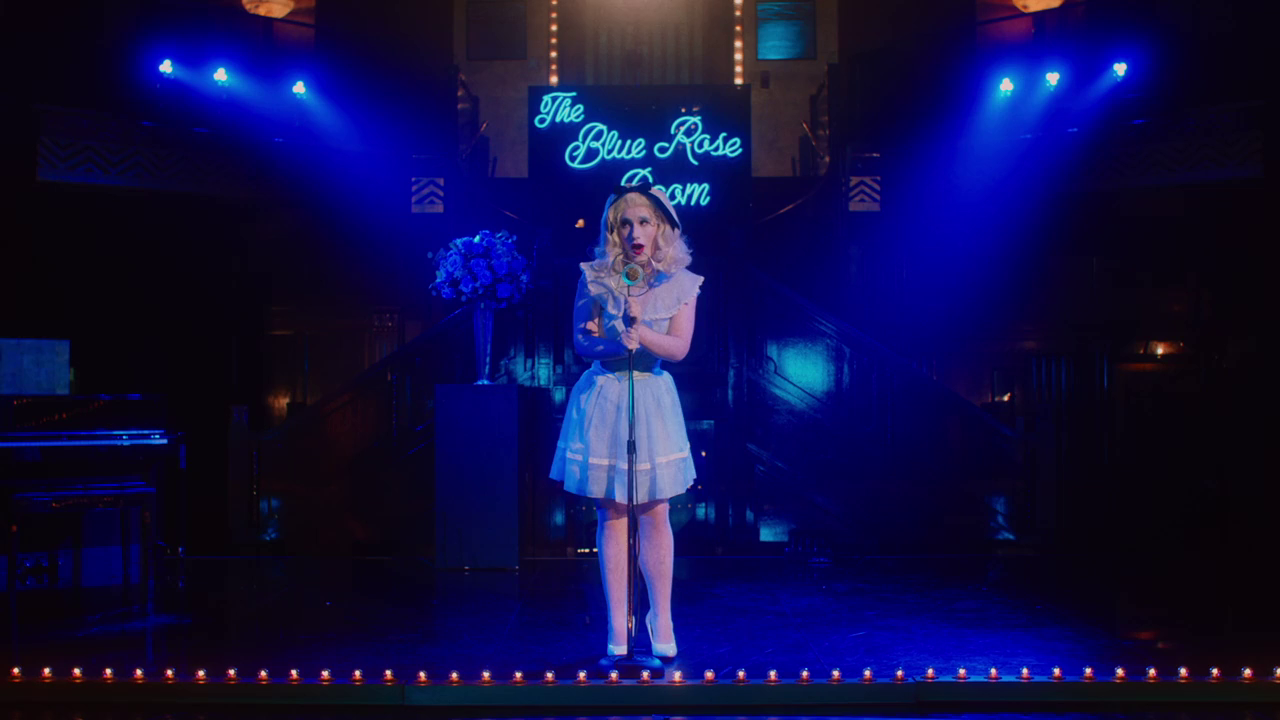

Los Angeles has always contained within itself more than a touch of the surreal. Maybe it’s the proximity to Hollywood that gives it a feeling of magic, or maybe it’s the strange confluence geographically of mountains and desert and ocean. Whatever the case may be, the City Of Angels is a setting ripe with mystery, and George Baron mines that setting with his surrealist neo-noir detective story The Blue Rose.

Detectives Dalton and Welsh (played respectively by George Baron and Olivia Scott Welch) are desperate to make a name for themselves in the 1950s LAPD after botching a high-profile case, so when a famous painter’s husband is brutally murdered, they jump feet first into solving the case. However, the deeper the dig for answers the further they find themselves in a bizarre and surreal underworld where nothing is what it seems. Heavy on the David Lynch with a dash of Kubrick, The Blue Rose seeks to create a Hollywood that may or may not be just a dream.

Baron and Welch are delightful to watch as they stumble through the smoky depths of ‘50s LA. There’s a naïve sweetness in their interactions that carries throughout the entire film and lends a genuine depth to the characters. Neither are stock noir characters; Baron is anything but the cool and calm macho detective, and Welch is equally distant from any sort of femme fatale. This departure from the norm gives the film an interesting feel and make them all the more likeable. It also gives the film genuine emotional stakes because it feels legitimately unpredictable. And Nikko Austen Smith as Sophie Steele is brilliant, adequately portraying someone who is ruthless and unhinged all the while playing the doe eyed damsel in distress. Baron is adept at cloaking the entire film in a mild sense of unease and making everything feel just off enough to be ominous, and even though we know exactly who the killer is you can’t help but feel that somehow everyone is a bad guy.

This entire film has a delightful quirkiness to it that I can’t quite pin down. It’s not quite Twin Peaks (more on that shortly) but more like Wes Anderson without all the twee stylism. The subtle offness of everything is cut with an almost saccharine sense of adoration for the ‘50s. Not in a Leave It To Beaver/Reagan-era yearning for a time when Black people weren’t allowed to use the same restrooms as white people type way, but more so for the style and zeitgeist of the ‘50s. Baron is clearly worshipping what he knows to be an idealized version of the decade, as opposed to the actual legitimate way the ‘50s played out, and I think that goes far to give the film a fresh perspective and feel.

Let’s just address the elephant in the room here: this film is clearly a love letter to David Lynch. From Viola Harlow channeling Isabella Rossellini to the idealized ‘50s setting to Ray Wise being in it, this film is laden with a feel of Missoula’s prodigal son. And that’s before the strange dream sequences even begin (and to give credit where credit. There are scenes that come off as Baron’s version of his favorite Lynch scenes (Welch watching in awe to the point of tears as Harlow vamps her way through a number at the Blue Rose that feels very much like the Club Silencio scene in Mulholland Drive). I still think the film works on its own, but there were times when I wish that Baron would rely less on his influences to tell a story and more on his own voice. This is his first feature film, so it’s understandable he’d lean into what inspired him, but it’s kind of a shame because I do think he has an interesting point of view all his own. The downside of course is that it feels as if Baron is so intent on shoving as much Lynch influence into the film that a lot of comes off merely as perfunctory and ornamental instead of necessary to any sort of narrative progression.
If you’ve got an itch that can only be scratched with a healthy dose of Twin Peaks/Mulholland Drive/Blue Velvet style noir strangeness, you will love this film. Even if you’re not a fan of Lynch’s work, I think The Blue Rose is still distinctive enough to be enjoyed for what it is: a tribute to ‘50s noir films packed with sinister lounge singers and world-weary gumshoes with a fifth of rye in their desk just trying to break the case. It’s a delightful misfit of a film, odd enough to be interesting enough but not so odd that It’s boring or alienating.




